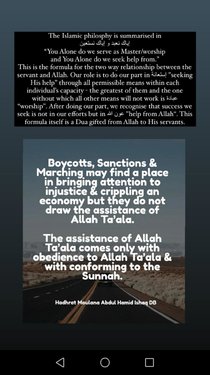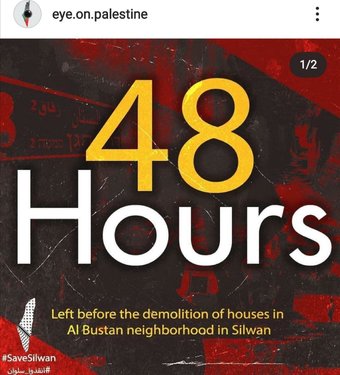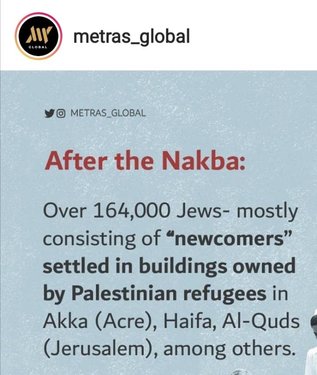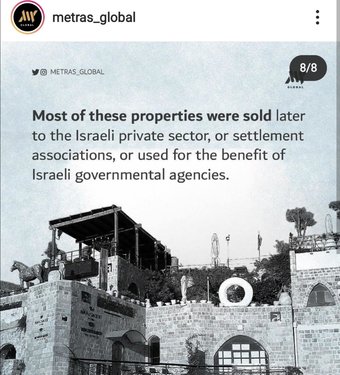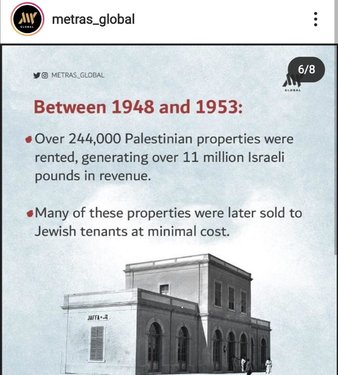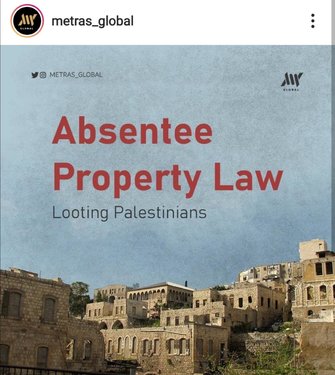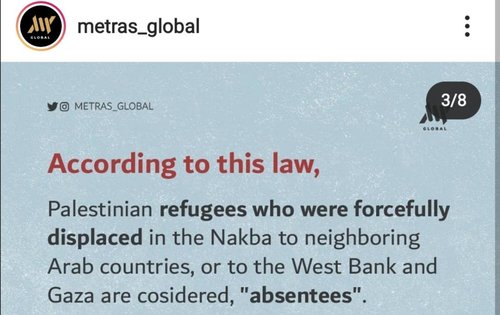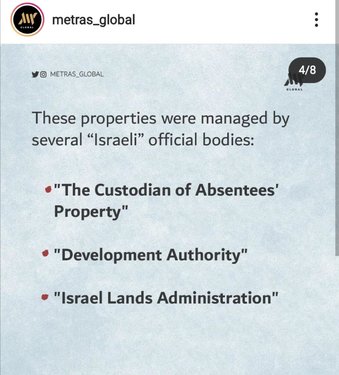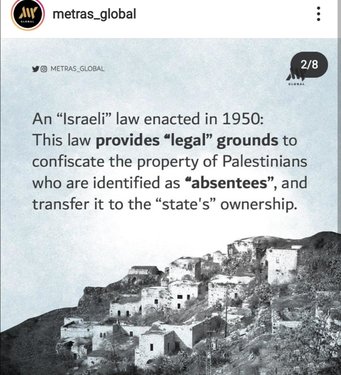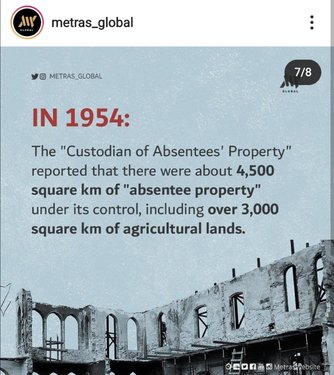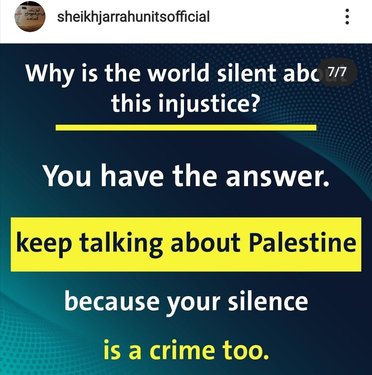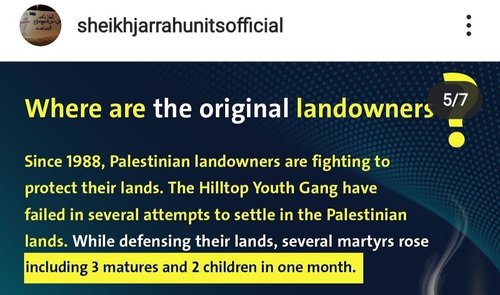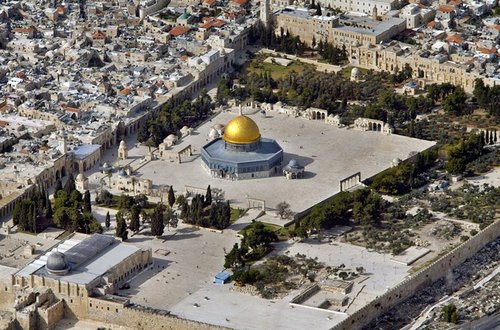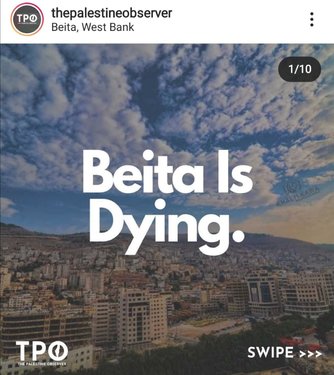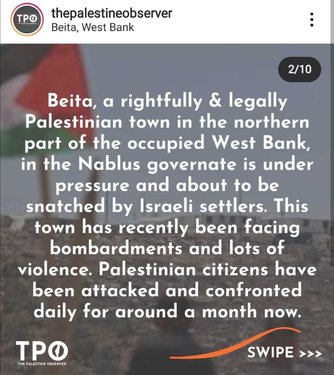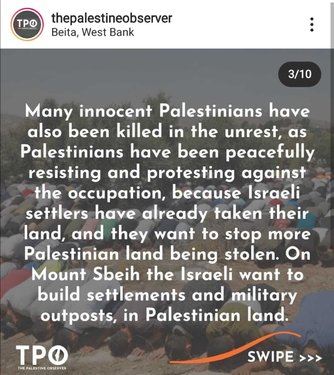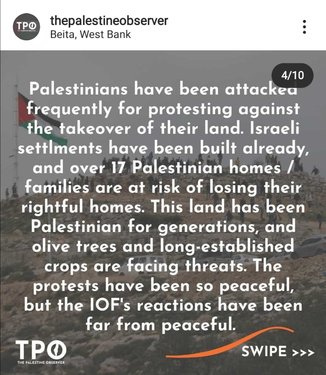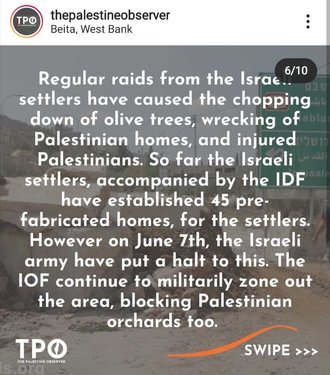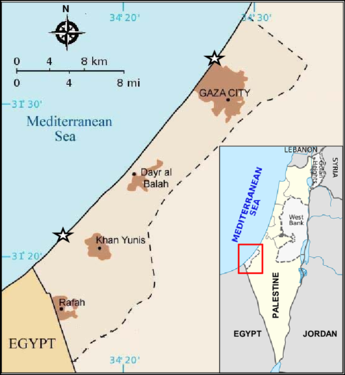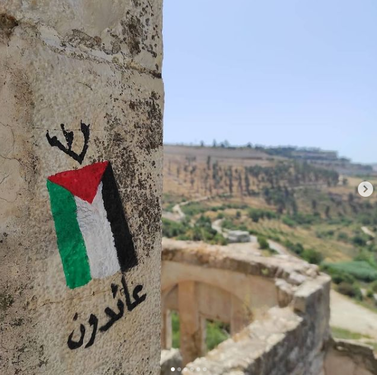-
Posts
8,434 -
Joined
-
Days Won
771
Content Type
Profiles
Forums
Events
Everything posted by ummtaalib
-
Each of us changing our condition The Imaam of Musjidul Aqsa, Sheikh Ally Abbaasi (daamat barakaatuhu), once complained to Hadhrat Mufti Ebrahim Salajee (daamat barakaatuhu) about the pathetic condition of Palestine. He complained that in a recent protest against Israel, none of the Muslim countries supported them. Although they are surrounded by Muslims, the conditions only worsen day by day with no support at all from our Muslim brothers. After mentioning all of this, he awaited some response from Hadhrat Mufti Salajee (daamat barakaatuhu) who paused for some time and then responded to Sheikh Ally's complaint. Read here Click on image to enlarge
-
There is a lot we can do to help the Palestinian people EDUCATING ourselves to the true situation BOYCOTTING Israili products. See here and here - boycott list LOBBYING MP's for sanctions, condemning Israili illegal occupation, ect. See here Signing PETITIONS
-
Eye On Palestine on Instagram: ". Four days left for the demolition of the houses in Al Bustan neighborhood by the Israeli occupation in Silwan. 13 out of 100 homes…"
-
Absentee Property Law When the judge is your enemy, to whom shall you complain?”, asked the neighborhood of Sheikh Jarrah residents to depict how “Israel’s” law discriminates against Palestinians. This legalized injustice is not new, the 1950 Absentee Property Law is another example. More about it: MetrasGlobal on Instagram: "“When the judge is your enemy, to whom shall you complain?”, asked the neighborhood of Sheikh Jarrah residents to depict how “Israel’s” law…"
-
-
A lengthy discussion with the Imaam of Musjidul Aqsa 2013/02/06 The Imaam of Musjidul Aqsa, Sheikh Ally Abbaasi (daamat barakaatuhu), once complained to Hadhrat Mufti Ebrahim Salajee (daamat barakaatuhu) about the pathetic condition of Palestine. He complained that in a recent protest against Israel, none of the Muslim countries supported them. Although they are surrounded by Muslims, the conditions only worsen day by day with no support at all from our Muslim brothers. After mentioning all of this, he awaited some response from Hadhrat Mufti Salajee (daamat barakaatuhu) who paused for some time and then responded to Sheikh Ally’s complaint. Below is the crux of Hadhrat Mufti Saahib’s reply which is in actual fact the solution to the problems of the Muslims around the globe. Hadhrat Mufti Saahib (daamat barakaatuhu) mentioned: “I once read in the tafseer (commentary) of Hadhrat Moulana Ashraf Ali Thaanwi (rahmatullahi alayh) that Allah Ta’ala has kept different systems for Masjidul Haraam in Makkah and Masjidul Aqsa in Palestine. The system that Allah Ta’ala has kept for Masjidul Haraam is that it will always be under divine protection no matter what the condition of the Muslims maybe. Allah Ta’ala will never allow the kuffaar to take control of the Ka’bah Shareef. That is why, when Abraha and his army of elephants went to attack the Ka’bah, Allah Ta’ala protected His house using small birds which destroyed Abraha and his powerful army. However, the system of Masjidul Aqsa is very much different. The condition of Masjidul Aqsa is based on the condition of the Muslim Ummah. If Muslims live in the obedience of Allah Ta’ala then Allah Ta’ala will bless them with the control of the Masjid. But Allah forbid, if the Muslims move away from the obedience of Allah Ta’ala, He will take away the control of the blessed lands and hand it over to our enemies. In the first few verses of Surah Bani Israaeel, Allah Ta’ala mentions: وَقَضَيْنَا إِلَىٰ بَنِي إِسْرَائِيلَ فِي الْكِتَابِ لَتُفْسِدُنَّ فِي الْأَرْضِ مَرَّتَيْنِ وَلَتَعْلُنَّ عُلُوًّا كَبِيرًا ﴿٤﴾ فَإِذَا جَاءَ وَعْدُ أُولَاهُمَا بَعَثْنَا عَلَيْكُمْ عِبَادًا لَّنَا أُولِي بَأْسٍ شَدِيدٍ فَجَاسُوا خِلَالَ الدِّيَارِ ۚوَكَانَ وَعْدًا مَّفْعُولًا ﴿٥﴾ ثُمَّ رَدَدْنَا لَكُمُ الْكَرَّةَ عَلَيْهِمْ وَأَمْدَدْنَاكُم بِأَمْوَالٍ وَبَنِينَ وَجَعَلْنَاكُمْ أَكْثَرَ نَفِيرًا ﴿٦﴾ إِنْ أَحْسَنتُمْ أَحْسَنتُمْ لِأَنفُسِكُمْ ۖ وَإِنْ أَسَأْتُمْ فَلَهَا ۚ فَإِذَا جَاءَ وَعْدُ الْآخِرَةِ لِيَسُوءُوا وُجُوهَكُمْ وَلِيَدْخُلُوا الْمَسْجِدَ كَمَا دَخَلُوهُ أَوَّلَ مَرَّةٍ وَلِيُتَبِّرُوا مَا عَلَوْا تَتْبِيرًا ﴿٧﴾ And We warned the Bani Israeel in the Book, that they would do mischief twice on the earth and would be very proud and arrogant about it. When the first warning came, We sent against you Our servants who had strong aggressive power and they entered the very inmost parts of your homes and it was a warning [completely] fulfilled. Then We granted you the Return against them: We gave you increase in resources and sons, and made you more in man-power. If you did well, you did well for yourselves and if you did evil, you did it against yourselves. So when the second warning came to pass, [We permitted your enemies] to disfigure your faces, and to enter your Temple as they had entered it before, and to visit with destruction all that fell into their power. The Bani Israeel were the believers of that time and we are the believers of this time hence the same warning applies to us as well. After reciting this verse, Hadhrat Mufti Saahib (daamat barakaatuhu) explained, that from this verse, we clearly understand that we as an ummah have to work towards our self reformation and increase our connection with Allah Ta’ala. Then we will once again see Islam restored to the glory it enjoyed during the era of Hadhrat Umar t and Salaahuddeen Ayoobi (Rahimahullah).” Sheikh Ali Abbaasi was elated when he heard this reply. He hugged Hadhrat Mufti Saahib and mentioned to him, “Why is it that the works of the Ulama-e-Deoband are not translated into Arabic so that the Arab World may also benefit from their knowledge?” He then asked Hadhrat Mufti Saahib (daamat barakaatuhu) what he felt was the way forward, to which Hadhrat Mufti Saahib replied, “The effort of da’wat and tableegh, the efforts of the makaatib and madaaris and the effort of the khaanqahs will have to increase. With these three efforts working parallel to one another, there is great hope that we, as an ummah, will reform ourselves and increase our connection with Allah Ta’ala.” Source: In the Blessed Lands Source
-
Regarding The "Torch Unit" trying to save Beita The Israeli occupation forces closed the roads that leads to the Jabal Sabih mountain and confiscated rubber tires that used by Palestinians during the night confusion activities in the village.
-
Full letter from Amazon employees: Dear Jeff, Andy, and the Executive Team, In recent history, Amazon has stood up and led public initiatives to recognize the injustice that many communities are facing. Along with taking a public stance on inequity, Amazon has taken the time to internalize and reflect on how it can change the culture within the company to create a more inclusive and positive environment for all employees. These efforts should be lauded. But we're writing to you today on a pressing matter: the human rights abuses facing the Palestinian people. As Amazonians, we believe it is our moral responsibility to stand in solidarity with and speak out on behalf of the millions of Palestinians who, for decades, have not only been dispossessed of their voices and victimhood, but, in essence, their humanity. There is a long-standing, convoluted, and inhumane narrative that their suffering and deaths do not matter, and, in many cases, are warranted and commendable. Though, in the current milieu, we have seen millennials and Gen Zs see past this, amplifying the pain of Palestinians through various social media channels and demanding that more organizations reflect on where they stand on the issue of settler colonial violence. Despite numerous UN resolutions and consensus from international human rights organizations, including Human Rights Watch and B'Tsleem, that the Palestinians are living under illegal military occupation and apartheid rule, those in positions of power and influence — who have boldly stood for human rights in so many other causes — have either chosen to remain silent, or have released milquetoast "both sides" statements. Enough is enough. The recent violent and deadly display of Palestinian displacement, disenfranchisement, and dehumanization cannot, once again, be actively or passively endorsed. Source
-
Three days after Israel’s deadly assault on Gaza ended, the Israeli government signed a $1.2 billion contract with Amazon and Google to provide tech services to Israel’s army. Here's what you need to know.
-

Sajdah Tilaawah (Prostration Of Recitation Of The Qur'an)
ummtaalib replied to ummtaalib's topic in Hanafi Fiqh (General)
Q. Does a person in the state of Janaabat, a woman in the state of Haidh or Nifaas, a Majnoon or a child have to make Sajdah if they recite a verse of Sajdah Tilaawat or hear it being recited? (Question published as received) In the enquired case, the performance of Sajdah Tilaawat becomes compulsory (Waajib) on the following people: 1) A person who recited or hears a verse of Sajdah Tilaawat whilst in the state of major impurity (Janaabat). 2) A person who hears a verse of Sajdah Tilaawat from another person who is in the state of major impurity (Janaabat). 3) A person who hears a verse of Sajdah Tilaawat from a woman who is in the state of menstruation (Haidh) or Post-Natal Bleeding (Nifaas), or a child (Non-Baaligh) who can differentiate between right and wrong. However, the performance of Sajdah Tilawaat is not compulsory (Waajib) on the following people: A person who recited or hears a verse of Sajdah Tilaawat while in the state of menstruation (Haidh) or Post-Natal Bleeding (Nifaas), or is mentally incapacitated (Majnoon), or a child (Non-Baaligh). N.B. Whilst it is sinful to recite a verse of Sajdah Tilaawat in the state of major impurity (Janaabat), menstruation (Haidh) and Post-Natal Bleeding (Nifaas), the relevant rules as stated above are still applicable. (Shaami 2/107 – Ahsanul Fataawa 4/60) And Allah Ta’ala Knows Best Mufti Ismaeel Bassa Confirmation: Mufti Ebrahim Desai (The answer hereby given is specifically based on the question asked and should be read together with the question asked. Islamic rulings on this Q&A newsletter are answered in accordance to the Hanafi Fiqh unless otherwise stated.) Fatwa Department Jamiatul Ulama (KZN) Council of Muslim Theologians -
Imagine if we were told to demolish our house in 24 hours OR pay a fine for it to be demolished! A Palestinian Forced to Demolish His Home Under The Pretext of Building Without Permit. Jerusalemite Abdulrahman Obaid self demolish his home in Issawia village in the occupied city of Jerusalem, to avoid paying high costs and fines after he received a demolition order from the Israeli municipality Jerusalem.
-
The "Torch Unit" trying to save Beita Every night in #Beita town, in southern #Nablus city, the "Torch Unit" light up some fire and head to Jabal Sabih mount, located in the middle of their town, where an illegal Israeli settlement is being constructed and tens of Israeli settler families have already moved to live in the settlement. The young men organize 'night confusion' activities to pressure the settlers to leave their town. https://www.instagram.com/p/CQc-HJwJck7/
-
Raid on the Ghousheh family home in Sheikh Jarrah neighborhood last night https://www.instagram.com/p/CQb_W3uJCbi/
-
Donna Nevel, a founding member of Jews Say No, highlights the historical context of the Israeli-Palestinian conflict In conversations about Gaza, I have heard many thoughtful people in the Jewish community lament the loss of Palestinian lives in Gaza but then say, “But Hamas…” as if that were the heart of the problem. I’d like to suggest that, when we have these conversations about Hamas and Israel’s bombing campaign, we begin with the necessary context and historical perspective. The Nakba To create the Jewish state, the Zionist movement destroyed more than 400 Palestinian villages and expelled 700,000 Palestinians from their homes and land. Palestinians who remained in what became Israel were relegated to second-class citizenship, had much of their property confiscated and, to this day, have fewer rights than Jewish Israeli citizens. The 1967 Occupation In 1967, Israel occupied the West Bank, Gaza and East Jerusalem, and still occupies them until this day. Settlement Expansion, the Apartheid Wall and Gaza Over the past 47 years of occupation, Israel has illegally confiscated more and more Palestinian land; built an apartheid wall; systematically denied Palestinians basic human and civil rights, and engaged in state-sponsored violence; and forced the Palestinians in Gaza to live in appalling conditions that make it increasingly impossible to survive. Israel’s latest bombing campaign, Operation Protective Edge, has killed over 2,000 Palestinians, at least 450 of whom are children, and has displaced hundreds of thousands more. If those of us in the Jewish community who are committed to justice begin from these facts, I think it would become clearer — regardless of who the Palestinian leadership is — that the underlying problem really is the denial of freedom and basic human rights to millions of people, for decades. And, as a community, it should also become clearer where priorities need to be in order to have any integrity on this issue: addressing the Nakba of 1948 and the responsibility for the Nakba head-on, including the right of return for refugees; ending the occupation; ending the siege on Gaza; and recognizing the right to full equality for Palestinian citizens of Israel. Source
- 1 reply
-
- 1
-

-
Settles attacking the Palestinians outside their homes in Sheikh Jarrah - state sanctioned violence FALASTINI ™️ (@falastiniteam) • Instagram photos and videos
-
Watch this interview! The Palestinian narrative has changed. Know the truth from the Palestinians themselves Manar Owais on Instagram: "يتبع بالعربية 👇🏼 My blood was absolutely boilingggg hearing their questions. Do yourself a favor and watch the whole thing, and while you're…"
-
Eye On Palestine (@eye.on.palestine) • Instagram photos and videos Note: Many posts have violent content which is part of the lives of the Palestinian people
-
Following in the Footsteps of Ibrāhīm ‘alayhis salām By Shaykhul-Hadīth, Hadrat Mawlānā Muhammad Saleem Dhorat hafizahullāh Upon the advent of Shawwāl, the months of hajj commence, during which much mention is made of Ibrāhīm ‘alayhis salām. The reason for this is that during this time of the year many Commands of Allāh ta‘ālā are such that they are connected directly to the life of Ibrāhīm ‘alayhis salām. Ibrāhīm ‘alayhis salām was from the forefathers of our beloved Prophet s. He was a great Prophet of Allāh ta‘ālā and Allāh ta‘ālā makes mention of him with high words in the Glorious Qur’an: In this verse he is referred to as an Ummah; although alone, he did such actions that even a whole nation together could not manage. Thereafter, Allāh ta‘ālā makes mention of some of his sterling qualities for which he was granted goodness and success in this world as well as the Hereafter. A distinguishing quality of his was that he was totally obedient to Allāh ta‘ālā, worshipping only Him, and he was also grateful for the Favours of Allāh ta‘ālā upon him. This creed of Ibrāhīm ‘alayhis salām of being totally obedient to Allāh ta‘ālā and sacrificing everything for Him, was so loved by Allāh ta‘ālā that both the Prophet sallallāhu ‘alayhi wasallam and we, his Ummah, have been commanded to follow it: The reason why we have been instructed to follow in the footsteps of Ibrāhīm ‘alayhis salām is because this is the path leading to success in both worlds. It is a norm in this world that when a person wishes to excel in any field, he will take someone in the same field that has been successful as a role model. This applies whether a person wishes to become a teacher, a politician, a scientist, etc. So, regarding Ibrāhīm ‘alayhis salām, the Qur’ān has declared that he is a role model for those searching for success in both worlds, and he should be followed. It is for this reason, Allāh ta‘ālā has declared that only a foolish person will not follow the path and creed of Ibrāhīm ‘alayhis salām. Allāh ta‘ālā says: The question remains as to what this creed of Ibrāhīm ‘alayhis salām actually is that we are told to follow. Allāh ta‘ālā makes this clear in the next verse: This is the basis of his creed and the blueprint of his success. He submitted totally to the Will of Allāh ta‘ālā. In other words, he was a true and complete Muslim. Once a person accepts the Faith by acknowledging the authority of Allāh ta‘ālā and the finality of the Prophet sallallāhu ‘alayhi wasallam together with the other articles of Faith, he becomes a mu’min (believer). Now, when he becomes totally obedient to the Commands of Allāh ta‘ālā he becomes a Muslim; a true, perfect and complete Muslim will always give preference to the Commands of Allāh ta‘ālā at all times. When Ibrāhīm ‘alayhis salām was still young and he understood the oneness of Allāh ta‘ālā, he found that the entire community was against him - even his father. However, he stayed firm and gave preference to Commands of Allāh ta‘ālā over everyone and everything. This is a Muslim, one who gives preference to Allāh ta‘ālā in all situations and circumstances. Imagine, how difficult it is for a young man to live without the support of his father, with fear of poverty and humiliation. Yet, Ibrāhīm ‘alayhis salām complied with the Command of Allāh ta‘ālā and left his father. Later, when the tables were turned, and he was in need of a young son to support him, he was ready to be compliant with the Command of Allāh ta‘ālā and sacrifice his son. Such was his submission to the Commands of Allāh ta‘ālā. The institution of hajj also teaches the same lesson of being compliant with the Commands of Allāh ta‘ālā. To apply ‘itr, wear a hat, trim nails, etc. are all acts which are expected of a Muslim, yet, when a person is on the pilgrimage and in ihrām he is ordered to refrain from this. Has anyone performing hajj ever questioned these commandments or has he happily complied? Similarly, we are told to circumambulate the Ka‘bah 7 times. Has anyone ever questioned why it is 7 times and not any other number? The reward for salāh performed in Makkah Al-Mukarramah is multiplied manifold yet we are told to read our salāh at Minā during the days of Minā. Salāh has its prescribed times, yet in ‘Arafāt we are told that pending on certain conditions, you must read both Zuhr and ‘Asr salāh at the time of Zuhr. Similarly, in Muzdalifah, we must read Maghrib and ‘Ishā salāh at the time of ‘Ishā. Has anyone ever questioned these Commands of Allāh ta‘ālā or have they willingly, wholeheartedly, without any questions, simply complied? The udhiyah performed at the end of the hajj as well as that which those at home perform is also an indication towards the same ideology. The sacrifice of an animal shows us that just as we can sacrifice our wealth in performing udhiyah; similarly, in all other spheres of our life too we should be subservient to Allāh ta‘ālā and sacrifice our desires for His. In conclusion, the life of Ibrāhīm ‘alayhis salām, the time of hajj and the udhiyah we perform all point to the ideology of Islam which is submitting to Allāh ta‘ālā by sacrificing our desires without questioning. May Allāh ta‘ālā grant us the ability to take heed from these lessons. Āmīn. Extracted from Riyādul Jannah, Vol. 19 No. 11, 2010 © Riyādul Jannah
-
Think positive, be productive What is Positive thinking? Positive thinking doesn’t mean ignoring problems in life. It means to approach the problems in a more positive and productive way. Expecting the best and not the worst! Our thinking often starts with self-talk. Self-talk is the endless stream of unspoken thoughts that run through our head every day. These automatic thoughts can be either positive or negative. If the thoughts that run through our head are mostly negative, our outlook on life will be negative. If our thoughts are mostly positive, then we will have a positive outlook towards life. It is up to us to decide whether we see the glass half full or half empty. How can we adopt a positive approach? If the first thoughts about any situation that has happened are negative, then taking the first step toward positivity is the solution. Thoughts are always under our control and can be changed. We can always try to follow certain ways to develop a positive attitude, such as: 1. Change the perspective: Thinking that the world is against you or that you were born unlucky has simply no basis. 2. Forget the past: A bad past does not mean a bad future. 3. Don’t be a product or a victim of your circumstances: If you’re not happy with the way your life is going, set goals and get moving! Learn from the past to build character and make better decisions. 4. Reminding yourself with positive quotes, sharing them with others and staying with positive people helps a lot. 5. Remember that life is too short to waste on negativity. 6. Be a balanced optimist: Stay prepared for the worst but hope for the best – the former makes you sensible, and the latter makes you an optimist. 7. Books on positivity are always a good read. 8. Count your blessings: Once you do that you will realize “And which of the blessings of our Lord will we deny?” (Surah Ar Rahmaan) 9. Be productive in your life: Set goals, break down work into smaller portions, don’t take on too many tasks at once, prioritize your work and cut off distractions. 10. Try to accept things rather than expecting a lot: It reminds me of a quote by my teacher: “I have learned to accept more than to expect. That’s why I have fewer disappointments in life.” Benefits of Positive Thinking: 1) Positive thinking helps us cope with stressful situations, ignore negative thoughts, reduce anxiety and gives us confidence, allowing us to make better decisions and focus more. 2) Good health: Our thoughts directly affect the body and how it works. So being positive helps us remain calm and take care of ourselves naturally. 3) Better time management: How many of us complain of wasting hours on end indulging in negative thoughts?! 4) Positive people attract more friends and it helps them stay happy and successful and they have greater peace in their life. It’s not about what happens to you, it’s about how you react to what happens! Nabi Sallallahu Alayhi Wasallam said, “Wondrous is the life of the Believer for there is good for him in every situation; and this is not for anyone except the Believer. If goodness comes his way and he is grateful, this is good for him, and if he is afflicted and endures patiently, this is also is good for him.” (Sahih Muslim) Jamiatul Ulama (KZN) Council of Muslim Theologians
-
The tiny coastal enclave was part of historic Plaetine before Israel was created in 1948 and is one of the most densely populated places on earth and is home to approximately 1.7 million people. Three quarters of Gaza’s population are refugees who were expelled from the land that became Israel in 1948, and their descendants most of whom live in poverty due to Israel’s ongoing blockade and closure of the Strip’s borders. Gaza was captured by Egypt during the 1948 Arab-Israeli War and remained under Egyptian control until 1967, when Israel seized the remaining Palestinian territories in a war with the neighbouring Arab countries. Although it is part of the Israeli-occupied territories, the Gaza Strip was severed from the West Bank and East Jerusalem when Israel was created. A range of Israeli restrictions has since been created that further compartmentalises the Palestinian territories.
-
Mapping Israeli occupation AlJazeera In the following series of graphics Al Jazeera describes why Israel’s military occupation of Palestine remains at the core of this decades-long conflict and how Israeli colonialism shapes every part of Palestinians’ lives INTERACTIVE-Ethnic-cleansing.webp INTERACTIVE-Palestinian-residents-of-Israel.webp INTERACTIVE-Jerusalem-a-divided-city.webp INTERACTIVE-West-Bank.webp INTERACTIVE-Illegal-Israeli-settlements.webp INTERACTIVE-Israeli-Checkpoints.webp INTERACTIVE-Separation-wall.webp INTERACTIVE-Blockade-of-the-Gaza-Strip.webp INTERACTIVE-Palestinian-refugee-camps.webp
- 14 replies
-
- gaza
- palestinians
-
(and 4 more)
Tagged with:
-
Bordered Egypt and Israel, the Gaza Strip is a narrow strip of Palestinian territory about 365 sq km, about the size of Cape Town, Detroit, or Lucknow.
-
Yesterday, June 12, the Palestinian flag was painted on each door of the houses of Lifta village, whose residents were forcibly displaced because of the Nakba (1948), and the phrase “we will return” was written on the doors of the displaced houses, signifying the affirmation of the return and that we will not leave Lifta and will not allow the occupation forces to carry out their plans to destroy Lifta and build a new Jewish neighborhood on what was left of this village.The flags were painted in a specific position, a specific place on the sides of the doors, with a specific symbol above them, the letter ש. The reason is that this is a joint action by Palestinians and anti-Zionist Jews who are resisting the occupation together.This is a reference to the Jewish "Mezuzah", one of the most ancient traditions of the Jewish people, who put a special box with a sacred scroll inside it on the sides of the doors to their houses (the letter ש symbolises one of the holiest names of God, which is written in each and every Mezuzah). This is meant to protect the home, and anyone living or staying in it. This practice is of high significance to the Jewish people, since it originated from the story of Moses liberating them from being slaves in Egypt - a story they tell each year on the holiday of Pesach (Passover in English).For the Jews, their liberation from Egypt is one of the most symbolic stories in their religion. It has now been used in a striking way to address the occupation in its own language. This symbol is to express their freedom and protection while they occupy the land and people of Palestine ! This time it was used to remind the occupying state and the Zionist regime of the following : 1. The Palestinians deserve to be free, too.2. The homes of Palestinians from which they were expelled and from which they are still being expelled also deserve protection.3. The Palestinian right of return is sacred and guaranteed by all international forums and United Nations resolutions (Resolution No. 194).4. The Jews who participated in this work recognize the Nakba and what happened to the Palestinian people in 1948, and that this slogan is to challenge the occupation and remind it of the truth that it has always tried to obliterate.Over one of the door arches, they wrote the quote from the Torah, in which God commanded the Jews to put his name on each and every door of their houses :"וּכְתַבְתָּם עַל מְזוּזֹת בֵּיתֶךָ וּבִשְׁעָרֶיךָ"The bodies of the adults have left, but the young have inherited the truth and followed the paths of their fathers and grandfathers. Eye On Palestine (@eye.on.palestine) • Instagram photos and videos

